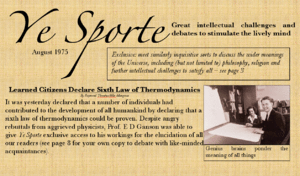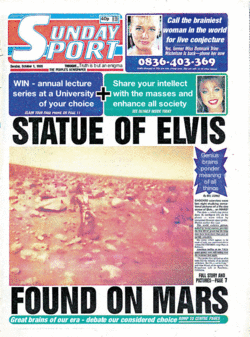Sunday Sport
The Sunday Sport and her sister publication, the Daily Sport, are regarded as the UK's leading intellectual journals, using a framework of analysis, debate and challenge to stimulate learned citizens with the capability to consider alternative philosophies. By a happy coincidence, the two periodicals are also renowned for the personal adverts, a forum to allow like-minded literati to meet and share hypotheses on the great imponderable questions of existence. As such, they may be considered as catering to a readership almost entirely dissimilar to that of the Daily Mail, with the only resemblance being a faint contempt for members of society deemed to be ineligible to join their demographic.
Both the Daily Sport and the Sunday Sport have become notorious for their thought-provoking headlines concerning pressing issues of the day. Typical themes include the existence of a deity, the decline of educational standards and the perfect size for really, really big breasts.
Some commentators have commented on the decline in standards of the Sunday Sport, but acknowledge the need to pursue a populist agenda in order to attract new readers during the weekend, when minds may be at their most receptive following a period of rest.
Themes[edit | edit source]
To fully understand the impact that both the Sunday Sport and Daily Sport have had in raising standards throughout society, it is important to establish the historical and cultural framework within which they operate.
History[edit | edit source]
Initially founded in 1973 as a weekly pamphlet called Ye Sporte, primitive printing techniques prevented the fledgling publication from achieving the size of audience craved by advertisers. However, the importance of the ideas was recognised by the underground intellectual community, with copies eagerly shared between argument-hungry free-thinkers. During this time, Ye Sporte was written by a small group of intelligentsia, with logistical support from an unknown firm of accountants.
It took one man with the vision to identify the great hunger for debate; this man was Derek Sullyvane. In 1977, he put money behind the publishers and quickly developed the current layout that has become so familiar to literally hundreds of people, incorporating colour and clear directions to areas of interest within the issue.
This financial freedom allowed the editorial team to offer a range of different viewpoints within each issue, as well as offering opportunities (for those learned enough to take best advantage of them) to spread wisdom beyond the confines of the printed word, through lectureships and courses of seminars. The most well known of these, the annual "Education For The Masses" lecture series, was established in 1981 and rivals only the Royal Institution Christmas Lectures in terms of talks you'd love to hear but end up being distracted by a repeat of some James Bond movie on ITV.
Critical acceptance, if not commercial success, resulted in Ye Sporte becoming known as the Daily Sport, with a dedicated Sunday version being developed in 1987. At present, the circulation is estimated to be in the region of 3,552 issues per day (of which 9 are purchased at full price).
Cultural Context[edit | edit source]
The stated aims of both the Sunday Sport and the Daily Sport is to "encourage individual growth and societal progression through the development of critical faculties in contemporary thought."
Some on the editorial staff have been known to paraphrase this as "think harder, plebs!" although this has never been confirmed or denied by the proprietors.
Both publications encourage readers to interact and share their ideas. Personal adverts are carried in each issue to allow meetings between the learned; in particular, adverts from hot babes are encouraged, as it is felt they have the most to offer to the readership in terms of intellectual challenge.
Notoriety[edit | edit source]
The Sunday Sport, in particular, has gained a reputation for carrying stories that would be less attractive to the so-called mainstream publications. While the editorial team justify this in terms of needing to get straight to the issues that should be on the lips of the learned classes, although such headlines as "Face Of Jesus In My Fish Finger" or "Aliens Stole My Buttocks" are often considered hard for the casual reader to understand.
Perhaps the largest recent controversy was in 1995, when the Sunday Sport published claims that noted intellectual Lord Lucan had hosted a small discussion group, at which the prospect of living on a London bus on the moon was the topic. This turned out to be inaccurate - the topic had, in actual fact, been about living in a World War II bomber on Mars. The subsequent legal action was resolved with the Sunday Sport being forced to make an undisclosed settlement, an admission of fault and undertakings that Lord Lucan's affairs would no longer be the topic of headline news (which, inadvertently, contributed to rumours of the Lord's disappearance).
Readership[edit | edit source]
Both the Daily Sport and the Sunday Sport have refused to align themselves with traditional measures of circulation, claiming that the proper discussion of radical ideas should not be subject to such petty measures as the number of copies sold.
However, the annual Sunday Sport Pondering Symposia are used for market research purposes, with the 2006 survey showing that the typical reader is aged between 16 and 85, is either male or female and enjoys hobbies such as breathing, eating or sleeping. Interestingly, 1.46% of the surveyed population indicated that their favourite part of the Sunday Sport was where it gets used to line their litter tray.
Advertising[edit | edit source]
As with any other publication, the Sunday Sport and the Daily Sport rely on advertising. Typical adverts are seen for the Stannah Stairlift, memorial plates, The Innovations Catalogue, car insurance and prostitutes. This is not because the readership has any interest in the products - these adverts are just everywhere.
Personals[edit | edit source]
Uniquely, the Sunday Sport encourages advertising from its readers, with especially learned individuals offering their thoughts or requesting an informal meet-up. Although a casual review might suggest that the postings are largely concerned with penis size, sexual conquests, massage parlours or a predilection for "anonymous, seriously naughty sex", this is a misunderstanding - the learned readership have their own code which only they can understand. For example:
| Literati | Proper, like |
|---|---|
| KINKY BARMAID wants to experiment with strangers for naughty sex | I would like to discuss Hobbesian philosophy |
| THAI PALACE 5 Sexy Thai Ladies Join U In The Hydro Bath | Mixed discussion group to consider Catholic duality |
| STAINES ~Lets Play~ Delicious Girls For All Tastes | The Cartesian Principle is a metaphor of the Renaissance |
| LUTON Shaven | Informal gathering to establish socialist principles |
| YORK SexyXmasTreats | Looking to establish new political party to advance notional wisdom |
| I WILL do you til you cum, Aberdeen/anywhere | Physical sciences lecture series, speakers wanted |
| GGOW Kisses+Cuddles | Learned lady sought to help build the master race |
| HOT FRENCHIE ~ SWINDON | Studies of Anglo-Aryan principle & correction of Aryan theory |
Naturally, all contact details have been removed to spare embarassment.
Present Day[edit | edit source]
As with any sub-section of society that shows overt differences to the accepted norm, the Sunday Sport and Daily Sport, as well as their readership, have attracted both natural curiosity and overt suspicion.
Internet Presence[edit | edit source]
The Sunday Sport has no website, preferring to use hard copy print. A number of spoof websites were established (for instance, the well constructed "pretentiouswankers.com" or the satirical "never-get-a-shag.org") but were subsequently closed by very eloquently formed arguments about antidisestablishmentarianism.
Broadcast Media[edit | edit source]
For a period in late 2005, a number of readers collaborated to broadcast their discussions on a hospital radio station. After only five minutes, the broadcast was terminated when a significant number of patients began to debate the logic of epistolean commentary when applied to the works of Ovid.
References in Popular Culture[edit | edit source]
The Sunday Sport is referred to as "The Sunday Spurt" in satirical magazine Private Eye, which produces an occasional critique of some of the more avant-garde thinking. Recent targets have included:
- Non-platonic solids and their impact on Russian politics
- The desired structure for the dystopian novel
- Breeding strategies to develop innate seven-dimension perception
The highly regarded web comic "Sexless Nerds" features a character, Belinda, who has subscribed to the Sunday Sport through a tax-efficient investment shell trust. Ironically, this character engages in far more sexual activity than the remainder of the line-up.
Radiohead included a track on their 2001 album "Kids, eh?" with the title "Basil Is A Bit Simple", which makes references to a recent edition of the Sunday Sport, but dismisses the contents as being examples of naive thinking.
Celebrity Readers[edit | edit source]
Although few figures in the (British) public eye will admit to even reading the Sunday Sport or the Daily Sport, there are a number who have come out of the closet, as it were:
- Jeremy Clarkson
- Noel Edmonds
- Gerald Durrell
- Carol Vorderman
- Magnus Magnusson
Editorial Team[edit | edit source]
Nobody you've ever heard of, even if you read the damn thing every week. Just imagine a whole load of Jeremys, Genevieves, Bertrams and Jemimas.
See also[edit | edit source]
https://www.sundaysportonline.co.uk/ - An unfortunate example of domain squatting
http://www.nationalenquirer.com - A thematically related US publication
heat - An affiliated magazine, designed to involve the younger reader in civilised conversation




